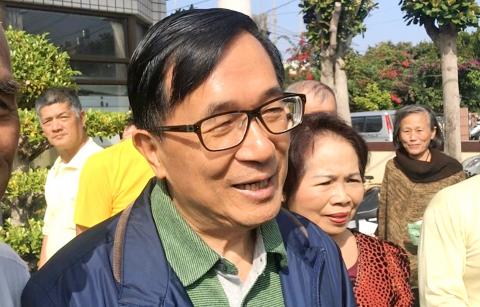Former president Chen Shui-bian (陳水扁), spiritual head of the Taiwan Action Party Alliance (TAPA), announced yesterday that he is withdrawing from politics and bid farewell to his supporters.
Chen, popularly known as “A-bian,” served as Taiwan’s president from 2000 to 2008.
He made the announcement in a statement after the party failed to win any seats in Saturday’s legislative elections.

Photo: Yen Hung-chun, Taipei Times
“I could not sleep last night and engaged in deep reflection,” Chen said.
“I fought the battle, but as the gardener of this small tree [TAPA], I feel it is beyond my ability to water, tend and watch it grow anymore,” he said.
“I am resigning, and would like to thank everyone for their support and votes, as well as those who have accompanied me from the very beginning to today,” Chen said.
TAPA, created by Chen with the backing of supporters of Taiwanese independence, was launched in Taipei on Aug. 18 last year.
The party advocates independence and seeks Taiwan’s entry into the UN.
In a video shown at the party’s launch, Chen said he believed that TAPA could secure 1 million votes in the legislative elections and win at least three seats or surpass the 5 percent threshold required for at-large seats.
Chen, embroiled in corruption scandals from his time as president, was first detained incommunicado on Nov. 12, 2008, and released on Dec. 13, 2008, after being charged.
He was detained again on Dec. 30, 2008, for nearly two years and after being sentenced to 20 years in prison on a series of corruption charges, began serving his sentence on Nov. 11, 2010.
Chen has maintained that his incarceration was the result of a political vendetta by the Chinese Nationalist Party (KMT) for his pro-independence views.
He was in prison until January 2015, when he was released on medical parole.
On Nov. 5 last year, Chen had his medical parole extended to Feb. 4 — the 20th time he has received an extension.

Alain Robert, known as the "French Spider-Man," praised Alex Honnold as exceptionally well-prepared after the US climber completed a free solo ascent of Taipei 101 yesterday. Robert said Honnold's ascent of the 508m-tall skyscraper in just more than one-and-a-half hours without using safety ropes or equipment was a remarkable achievement. "This is my life," he said in an interview conducted in French, adding that he liked the feeling of being "on the edge of danger." The 63-year-old Frenchman climbed Taipei 101 using ropes in December 2004, taking about four hours to reach the top. On a one-to-10 scale of difficulty, Robert said Taipei 101

Nipah virus infection is to be officially listed as a category 5 notifiable infectious disease in Taiwan in March, while clinical treatment guidelines are being formulated, the Centers for Disease Control (CDC) said yesterday. With Nipah infections being reported in other countries and considering its relatively high fatality rate, the centers on Jan. 16 announced that it would be listed as a notifiable infectious disease to bolster the nation’s systematic early warning system and increase public awareness, the CDC said. Bangladesh reported four fatal cases last year in separate districts, with three linked to raw date palm sap consumption, CDC Epidemic Intelligence

Taiwanese and US defense groups are collaborating to introduce deployable, semi-autonomous manufacturing systems for drones and components in a boost to the nation’s supply chain resilience. Taiwan’s G-Tech Optroelectronics Corp subsidiary GTOC and the US’ Aerkomm Inc on Friday announced an agreement with fellow US-based Firestorm Lab to adopt the latter’s xCell, a technology featuring 3D printers fitted in 6.1m container units. The systems enable aerial platforms and parts to be produced in high volumes from dispersed nodes capable of rapid redeployment, to minimize the risk of enemy strikes and to meet field requirements, they said. Firestorm chief technology officer Ian Muceus said

MORE FALL: An investigation into one of Xi’s key cronies, part of a broader ‘anti-corruption’ drive, indicates that he might have a deep distrust in the military, an expert said China’s latest military purge underscores systemic risks in its shift from collective leadership to sole rule under Chinese President Xi Jinping (習近平), and could disrupt its chain of command and military capabilities, a national security official said yesterday. If decisionmaking within the Chinese Communist Party has become “irrational” under one-man rule, the Taiwan Strait and the regional situation must be approached with extreme caution, given unforeseen risks, they added. The anonymous official made the remarks as China’s Central Military Commission Vice Chairman Zhang Youxia (張又俠) and Joint Staff Department Chief of Staff Liu Zhenli (劉振立) were reportedly being investigated for suspected “serious